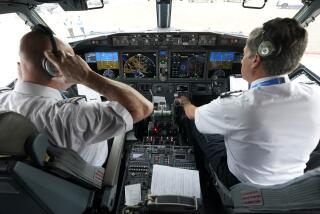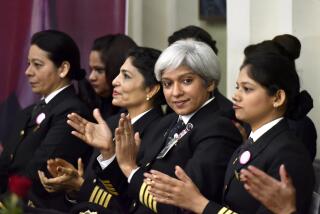Wolf’s Turnaround Touch Put to the Test at Flying Tiger
- Share via
It was Stephen M. Wolf’s first meeting with pilots as the new chairman and chief executive of the financially troubled Flying Tiger Line. The August day in Los Angeles was hot, and the air conditioner in the room at Tiger’s headquarters was not working. Wolf removed his jacket, revealing his trademark red suspenders.
This was the moment the 13 pilots union leaders had awaited. They peeled off their own suit coats, each revealing a pair of red suspenders. The pilots roared and, as one of them recalls, “even Wolf had to laugh. What else could he do? We had him.”
So began a delicate game of one-upmanship that has escalated into a confrontation that could result in the shutdown of the airline, the world’s largest air cargo carrier. In an effort to reduce operating costs quickly, Wolf has given the airline’s 650 pilots until Friday to agree to massive wage and benefit concessions.
The next week or so promises to severely test Wolf’s reputation as an airline turnaround artist--especially since a key element of his past success has been his ability to get along with organized labor. Flying Tiger’s board will meet Nov. 19 to decide whether the airline, which is losing thousands of dollars each day, can afford to stay in business.
Wolf came to Flying Tiger after two years as president and chief executive of Republic Air, a floundering carrier that he turned profitable in two years by shedding unprofitable routes and winning sizable wage concessions. Wolf sold Republic to Northwest Airlines last January for $884 million, earning recognition as an expert manager.
Wolf, who declined to be interviewed for this story, started his career at American Airlines, where he worked for 15 years before moving to Pan American World Airways as a senior marketing vice president in 1981. A year later, he joined Continental Airlines as its president, only to leave three days before the company sought to break its union agreements by filing for protection under the U.S. Bankruptcy Code.
Even if Wolf passes the first hurdle with the pilots, the task ahead of him is formidable. The air cargo carrier is losing money and important business on its overseas routes. It is burdened with debt, its domestic fleet of 727 tri-jets is old and its labor costs are among the highest in the industry.
Wolf has said he plans to refinance about $300 million of Flying Tiger’s $525-million debt and to tighten the airline’s inefficient cargo delivery network. These plans are contingent on obtaining substantial concessions from labor.
He is asking the pilots to give up 25% of their wages and another $10 million in benefits for three and a half years to save the airline at least $30 million a year. He also wants to establish a two-tier pay scale, under which newly hired pilots will be paid at lower rates. If the pilots agree, Wolf will begin bargaining with Flying Tiger’s three other unions. The company employs 6,500 people, including about 1,000 in Los Angeles.
So far, the pilots have resisted substantial wage concessions. They have already rejected an earlier Wolf proposal that called for a 20% cut in wages and seem unlikely to approve the deeper pay cuts that he now says are necessary due to the airline’s deteriorating financial condition.
The pilots met during the past weekend to discuss Wolf’s newest proposal and are likely to ask him for more time to consider it, according to a union source close to the negotiations.
Since arriving at Flying Tiger in August, Wolf has tried hard to court the employees. One of his first actions was to close the executive dining room so Tiger’s top managers would eat lunch with other employees in the company cafeteria.
In three months at Flying Tiger, he has flown to 18 cities around the world to introduce himself to employees and argue the necessity of pay cuts--a practice he followed during his years at Republic. Employees who have met with him say he is magnetic.
“If he took your wallet, you would thank him for burdening himself to carry it for you. He has that kind of charisma,” one Flying Tiger pilot said.
Union leaders at Republic Air say they found Wolf easier to deal with than other executives at the airline. “I give him a lot of credit for turning the airline around,” said Kirk Faupol, who heads the Republic pilots union that agreed to a three-year, 15% wage cut.
Exudes Integrity
Louis A. Marckesano, an airline analyst with the Janney Montgomery Scott investment firm in Philadelphia who has followed Wolf’s career, said Wolf is accepted by labor because he exudes integrity. “How do you describe charisma? He is believeable,” said Marckesano, who calls Wolf the “most impressive of the younger executives in the industry. He knows what he wants and how to do it.”
Flying Tiger pilots say privately that they respect Wolf, despite the strain caused by negotiations. “I feel he will be good for Tiger,” said one pilot who is close to the negotiations. “He has the experience. I think the pilots are willing to give concessions. But we have to know what it will get us. We don’t want him to turn around and sell the airline, like he did with Republic.”
At six-feet, six-inches, the 45-year-old Wolf is an impressive figure, say those who have met him. He is energetic, often behind his desk before 7 a.m. and working late into the evening.
He holds early morning briefings with his top executives at Flying Tiger each day to stay abreast of the airline’s operations, a practice he initiated at Republic. “He sets a grueling pace,” said one Flying Tiger executive.
Some airline executives who have worked with Wolf complain that he can be stiff, formal and obsessed with details. At Continental, he insisted on being addressed as “Mr. Wolf” by all but a handful of vice presidents, one executive said. He involved himself in such trivia as selecting uniform accessories and paint colors for new Continental offices. “It wasn’t necessary,” the executive said. “There were other people to do that.”
But others appreciate Wolf’s attention to detail. Jeffrey Kriendler, a senior vice president at Pan Am, recalled that Wolf insisted on knowing how much time it took to unload baggage on certain flights so passenger service could be improved. “He was a dictator, but in a nice way,” Kriendler said. “He demanded a lot from people and held them accountable. He wasn’t afraid to show leadership.”
Wolf apparently has the support of Robert P. Jensen, who became chairman of Flying Tiger’s parent, Tiger International, last year. Jensen, who was also the chairman of Flying Tiger until Wolf joined the company, has apparently given Wolf greater authority to act than was enjoyed by Wolf’s predecessor, Lewis H. Jordan, whose title was president and chief operating officer.
Jensen declined to be interviewed for this story but said through a spokeswoman that Wolf “runs Flying Tiger, as his title suggests.” Jordan, now chief operating officer at Continental Airlines, said that he, too, was talking with Flying Tiger’s unions about concessions before he left Tiger “with mixed emotions” in March.
“We were working very hard to do some of the same things that Wolf is doing. . . . Clearly it is very important that he is the CEO and chairman,” Jordan said.
Wolf is also supported by Saul P. Steinberg, the New York investor who is Tiger International’s biggest shareholder and who controls two seats on Tiger’s board of directors. Steinberg, who has suffered a paper loss of about $50 million on his 12.9% stake in Tiger International, which he purchased between 1979 and 1981, has long pushed for austerity measures at the airline.
“The cost-reduction proposal put forth to Flying Tiger pilots is essential if the company is to continue operating,” Steinberg said through a spokesman last week. “This, and the deadline that they (the pilots) have been given is something they must understand is the reality.”
Losing $74,000 a Day
Flying Tiger has lost an average of $74,600 a day since 1981. Last year, it lost $44.2 million on revenue of $1.1 billion. The company reported a third-quarter profit of $1.5 million on revenue of $286.6 million that the company attributed to a 35-cent-a-gallon drop in jet fuel prices. “Had the airline operated at last year’s fuel prices, . . . financial results would have deteriorated,” the company said in a statement released Oct. 23.
Airline industry analysts say that Flying Tiger’s pilots are among the last in the industry to be asked for major concessions. The airline was founded in 1945 by a group of World War II pilots, and it flourished until the airline industry was deregulated in 1978 and low-cost air cargo carriers began entering the market. Flying Tiger also suffered from a lack of cash as Tiger International’s diversification into railroad cars and trucking companies failed.
Wayne M. Hoffman, Flying Tiger’s chairman from 1967 to 1985, “couldn’t find it in himself to touch the pilots” to save cash, a source close to Hoffman said. Flying Tiger’s pilots are among the highest-paid in the industry, earning an average of $117,000 a year, according to the company. The pay ranges from $60,000 for domestic pilots who fly 727s to $180,000 for those who fly 747 jumbo jets on international flights.
There are indications that Wolf is developing alternatives for Flying Tiger if talks with the unions should fail.
On Oct. 23, an unusual memo was posted on bulletin boards at Flying Tiger’s Los Angeles headquarters. The memo from company management said Federal Express Chairman Fred Smith had testified at a Transportation Department hearing the day before that Federal Express “expected to acquire Flying Tiger’s (landing) slots for its use in Japan.”
Through a spokeswoman, Smith denied making that statement “or anything like it.” But Flying Tiger’s memo suggested that discussions about a possible sale might be under way. It said: “We want to clarify that Flying Tiger has not reached an agreement to sell . . . our 747 fleet or our international routes to Federal Express.”
The series of hearings of which the Oct. 22 session was part is not expected to end until today, and the transcript is not yet available.
A Flying Tiger spokesman declined to comment on the memo and some union leaders have privately dismissed it as a bargaining tactic. Flying Tiger’s five late-night slots at Tokyo International Airport at Narita would be valuable to competitors seeking entry into Japan, analysts say, because the airport’s slots are filled.
A sale would be significant because the Pacific region provides most of Flying Tiger’s business. In 1985, the Pacific region provided 50% of Flying Tiger’s revenue, although the airline’s share of that market is fast eroding due to competition from other carriers, especially Nippon Cargo Airways, a year-old Japanese air cargo carrier.
Edwin C. Laird, a Seattle air cargo consultant, has estimated the Flying Tiger’s share of the U.S.-Japan cargo business--which makes up the largest part of its Pacific region turnover--has declined to between 15% to 18% from 35% a year ago.
Some analysts think that if Flying Tiger can reduce its costs, it can become more competitive and recover some of its lost business without having to dismantle the company. Those who have worked with Wolf have not given up on Flying Tiger yet.
“There probably isn’t a better man in the industry to take on the job than Wolf,” said John Krimsky Jr., a former Pan Am vice president, who recalled that Wolf tightened Pan Am’s slack route system in short order. “In air cargo, the product you’re selling is service. Stephen understands better than anyone else that it is the level of service that produces loyal, dedicated customers,” Krimsky said.
He added that Wolf “creates an atmosphere in which change is possible. He sets objectives, targets of opportunity, and works to meet them. For me, it was like a breath of fresh air.”
More to Read
Inside the business of entertainment
The Wide Shot brings you news, analysis and insights on everything from streaming wars to production — and what it all means for the future.
You may occasionally receive promotional content from the Los Angeles Times.










